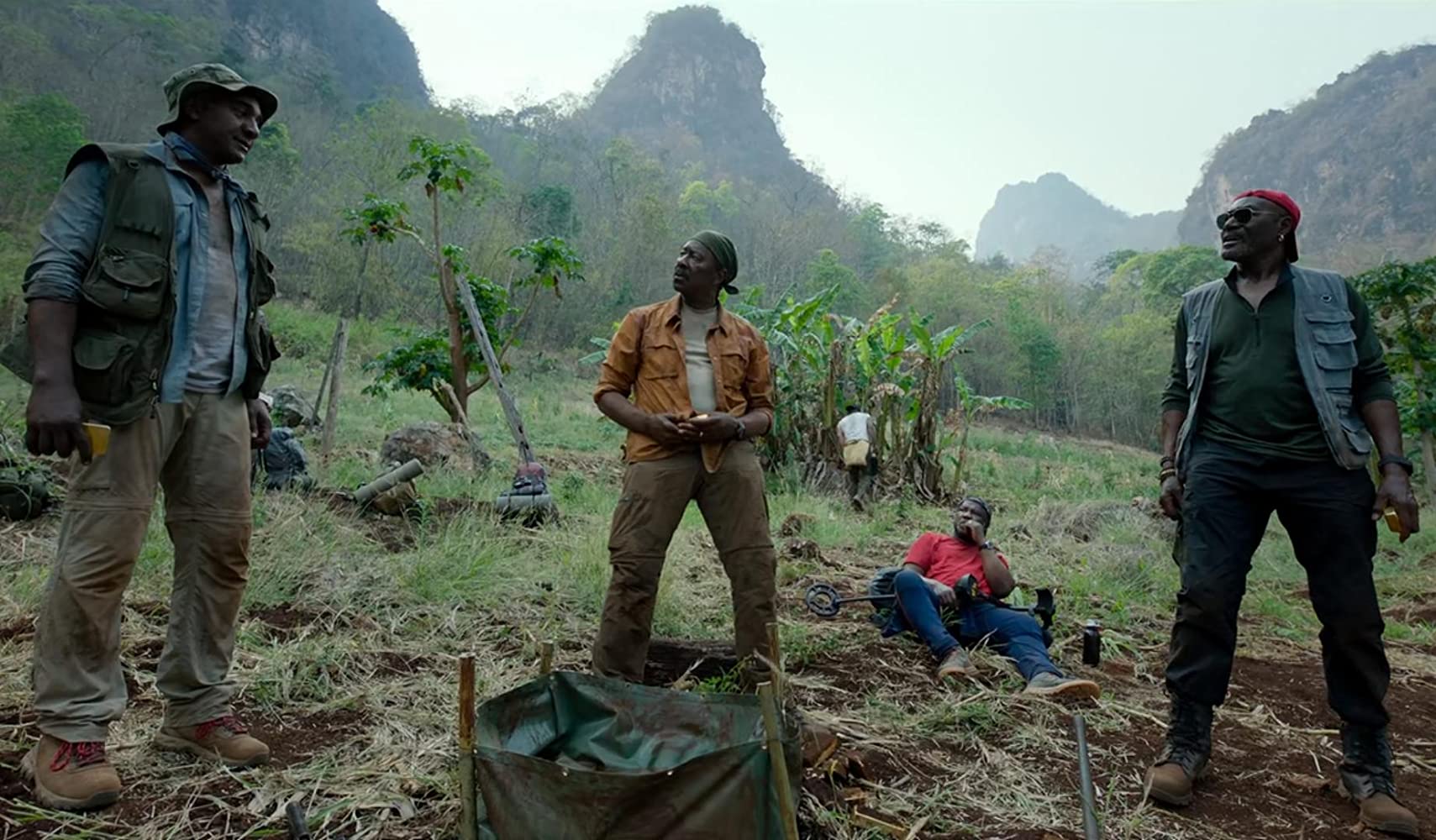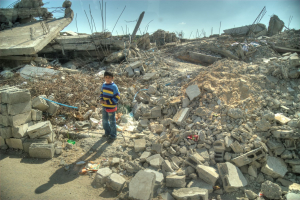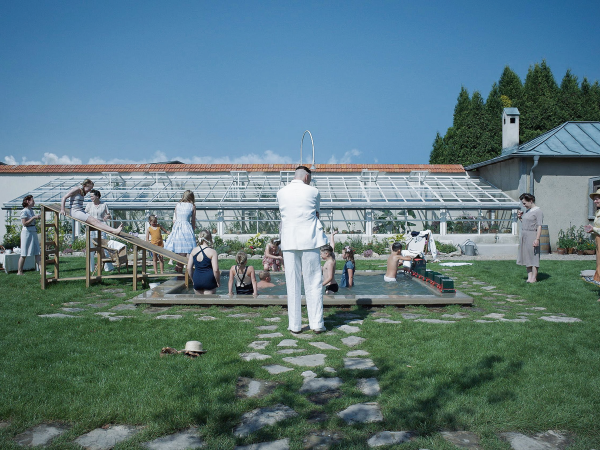
Reactionary Reflexivity: Sealing the Iron Dome on Media Coverage of Gaza, Part One
Part One of two articles on the modern media, by Dennis Broe. Image above: The New York Times: Is Any of Their News Fit to Print?
There was a time, before postmodernism had atrophied and before it simply became a formal textual strategy for ignoring what is going on in the world, when one of the early postmodern bywords “reflexivity” connoted a kind of fun and carefree field of play with a satirical overtone that made all kinds of intertextual relations possible.
In today’s media field, however, reflexivity is a trick used to seal the discussion and make sure that the limited media boundaries of discourse are never breached. In literature there is the rise of narcissism in autofiction (Karl Ove Knausgård’s A Death in the Family) or of an infinite play of incestuous signifiers in metafiction (Mark Haddon’s The Curious Case of the Dog in the Night).
In film and television, the earlier exposure of the wires of the cinematic apparatus has given way to complexification as a trope that conceals the fact that there is no actual referent outside the apparatus. Thus, Marvel’s Loki maps the possibilities of the online world of diverging timelines which do nothing but reify and promote Facebook’s virtual and now failing (as is the Marvel formula) Meta World.

Loki and Meta World - limited, not infinite
This predilection though is most overwhelmingly dominant in the mainstream corporate media’s coverage of what is happening in Gaza. The New York Times continually uses the trick of linking as an assertion of proof to stories by… The New York Times. A recent article purported to be perplexed at, despite the supposed groundswell and its attendant pressure, why the Writer’s Guild had not condemned the October 7 uprising. However, the “groundswell” and the pressure was mainly coming from…The New York Times. The media bubble validates itself and makes it seem that it is part of an overall movement when in fact the stories originate from the same source or sources, all behind a hermetically sealed bubble.
Reflexivity, no longer a playful and potentially satirical device, has hardened into simply a means of a minority maintaining power and acting like they are the majority, as now most of the people in the U.S., from no matter what party, favour a ceasefire in Gaza. That fact is seldom acknowledged in the corporate media bubble, as CNN initially forbid the word “genocide” from ever being emitted on its soundstages, and as the New York Times in a memo to its staff equally forbade “genocide” as well as “ethnic cleansing” and “occupied territory.”

The News Not Fit to Print
Those words were only then adopted and in a limited and “italicized” format when it became clear that most of the American public, the media audience, was resisting the one-way coverage. The boundary around which “civilized” media discussion is permitted is sometimes called ‘The Overton Window’.
The window may shift depending on public opinion but there are narrow limits beyond which corporate media will not allow. To suggest for example that October 7 was not a terrorist attack but rather, as George Galloway described it on YouTube, “a prison breakout”; or to point out that Joe Biden soiled himself as he used D-Day to campaign for more war; or that Biden’s emergency aid port in Gaza was used by the Israelis in a mass slaughter in Gaza, where the Israelis besides killing and wounding over 1000 people freed 4 hostages but killed 3 others, all these are outside the window.
If they do make their way into corporate media coverage they do so as an aside dropped in in the middle of a discourse that rationalizes the other actions: i.e., D-Day where the Germans, the cause of the invasion, are invited and the Russians, who largely rid Europe of the Nazis, are not, is a glorious event; that Biden’s port is a humanitarian endeavor; and that the “daring” Israeli raid was a courageous act akin to the Mossad’s freeing of the hostages at Entebbe instead of a war crime.
The Times will often backtrack, as they did on the Israeli attack on the Palestinian camp in the hostage release story and the next day ‘reassess” what actually went on, but the impression is formed in the first 24-hour news cycle. If, as in this case, the media files an assessment the next day, it is then countered, as was this story, a day later in a return to the “heroic” tale, most likely after the outlet has been chastised by its State Department masters. The Overton Window in the case of coverage of Gaza is an Israeli Iron Dome through which little alternative coverage penetrates.
The Perversion of Reflexivity
The coalescing of self-referential trends in postmodern thought was outlined in Robert Stam’s Reflexivity in Film and Literature in 1985. Stam’s work, describing what he termed this “other tradition,” drawing on literary texts including Rabelais, Lawrence Sterne and his “ur text” Cervantes’ Don Quixote, focused attention on the process of “the construction of the fictive ‘world’ through writing [and no longer] through consciousness.”
Besides the playful aspect of these references, Stam argued that the political thrust of this tradition, carried forward most notably by Brecht and which in film and literature has continued to expand, is that by “drawing attention to the process of the construction of the fictive world,” these works “lay bare the material construction of the text.” By pointing to their own textual constructs, they “break with art as enchantment.”
The argument is that reflexive examples – and in cinema Stam’s ur texts are by Jean-Luc Godard – “interrupt the flow of narrative in order to foreground the specific means of literary and filmic production through such methods as “narrative discontinuities, authorial intrusions, essayistic digressions, stylistic virtuosities.” The accumulation of these strategies is “playful, parodic and disruptive” demystifying “our naïve faith in fictions while opening new vistas for literary and cinematic expression as a whole in a double movement of “celebratory fabulation and demystifying critique.”
Stam’s argument is highly nuanced, acknowledging that there is a perennial tension between illusionism, though here presented negatively as “substantiated fact,” and reflexivity which “points to its own mask and invites the public to examine its design and texture.” Aware also of the fact that “the reflexivity of a certain avant-garde is eminently co-optable and easily reappropriated by the hegemonic culture” and that forms of television reflexivity including commercials and that employed by the direct address of the audience by TV news “rather than trigger alienation effects” “often simply alienate.”
The book’s appearance in the mid-80s was at the time when these techniques were passing over into the mainstream, being employed on network TV for example in the constant debunking of the staid devices of late-night talk shows by NBC’s David Letterman and Showtime’s meta series It’s Gary Shandling’s Show about a comedian named Gary Shandling who lived in Sherman Oaks with actual friends and neighbors such as Tom Petty popping in to say hello.
The trend toward reflexivity though has hardened. Instead of a progressive deconstructive device, the movement of “the process made visible,” now part of its own genre termed metafiction, is often seen, instead of expansionary, as “a symptom of literary exhaustion.” And not creativity but narcissism is the description now most often levelled at this hardening of literary reflexivity.
It was, as one critic put it, as if the novel had no more territory to develop and so it turned inward on itself in a kind of “spectre of infinite regress.” This is a frenzy of a style whose most salient characteristic is not its exposure of the means of literary production but rather its construction of an interior world hermetically sealed from the actual one.
What is driving this regress and retreat is a failure to confront the triple dangers of an ever more rapid escalation toward nuclear war, unheeded climate catastrophe, and ever increasing inequality, marked by an attack on the working and middle classes under the claim of fighting inflation and the creation of more low paying jobs in a condition now called “in work poverty.”
Trump and Biden
No wonder that (bourgeois) artists are now “committed only to endless, self-indulgent textual play,” which in the end is a mirror of the sealed-off quality of the Western, imperialist, settler-colonial world that is even now being surpassed and isolated by the Global South in forms such as the BRICS alliance. In a sense metafiction, sometimes seen as a harbinger of the end of the novel, is, as is the candidacy of the geriatric defenders of an ever more oligarchic “Free World” Trump and Biden, also a harbinger of the end or exhaustion of the West and in particular of Western bourgeois democracy.
This aesthetic practice, in an era of increasing financialization and ever more rapid deindustrialization, has its “reflexive” echo in the economic practice of stock buybacks where companies instead of productive investment pump up the value of their own stock to further reward already wealthy shareholders.
These parallels also help to explain why literary and cinematic metafiction has broken through to enter the privileged mainstream of a public consciousness now imbued with these values.
Whereas for Stam, “A socially strategic reflexivity…can lay bare the devices of art while exposing the mechanisms of society,” that moment may have passed into simple reaffirming of a closed world.


David Letterman, before and after
Take the aforementioned examples of David Letterman and Gary Shandling. Letterman’s rabid critique and exposing of the money-grubbing, penny-pinching methods of General Electric’s ownership of NBC was bounded by his not getting The Tonight Show host job. When he then was awarded the CBS equivalent, the satirical exposing element of the reflexivity disappeared and hardened, as in metafiction, into complicated games playing.
It must be noted that Shandling, who never got a job as a late-night host, went on to create one of the most vicious exposés of the vacuousness and backbiting of late night entertainment culture in The Larry Sanders Show, but here the reflexive elements of his previous series receded and the more overt satirical elements came to the fore.
In series TV production, the element of reflexivity has combined with a hardening of generic conventions to produce, with mixed results, series which reflect on their own generic construction, seen in the continual film noir clips viewed by the movie-loving detective in Sugar and the meta-references and sometimes deconstruction of cinematic depiction of the Vietnam War in the spy series about the end of that war, The Sympathizer.
While the reflexive elements harden, actual attempts to overturn the generic codes are instead discarded. Take the example of the BBC’s Channel 4 2004 series NY-LON, a romcom where in the end none of the three couplings are successful and the main romance flounders on the opposition of the bohemian female to the lifestyle of a banker. That rewriting of the genre was never pursued and the romcom promptly returned to happily ever after.

The Curse, orbiting the earth and leaving critique behind
Perhaps the most vacuous use of the meta-reflexive trend was in the final episode of The Curse, (23) a series about the greed and hypocrisy of gentrifying land developers which instead of driving home that critique becomes simply an epic and literal flight of fancy and manages to nearly abolish what had gone before. Needless to say that bastion of bourgeois reflexivity The New York Times hailed the episode as a series breakthrough.
Conclusion: Toppling Another Postmodern Icon
There is another pillar of postmodern thought that is equally in danger of collapsing, and that is “post-colonialism.” The discipline came to the fore in the two decades of the 1990s and the first decade of the new millennium, a time of US unipolar dominance. Post-colonialism itself, whose founding tenet is that there is no separating the imbrication of the colonizer and the colonized, is a kind of compromise formation. The push of Global South scholars for equality was met by a pushback by Anglo and Western scholars fearful that this area of study would leave no place for Western intellectuals. So was born, in the wake of and, partially as a reaction to, 40 years of revolutionary activity, an imperative to put studies of the colonial center back at the heart of the debate.
What is happening though is similar to what Freud claimed with Dora: reality is intervening and curing the neurosis. The emergence of BRICS and the resistance of the Global South, first to being enlisted in the Ukraine war and then in general to being made a part of three global wars against Russia, China and Iran that would decimate the world and halt the drive for development of those in the majority of the world, is hastening a questioning of whether in key ways the Global South may go its own way and throw off the yoke of colonial “imbrication,” with the new key word being “sovereignty,” the ability of each of these countries to pursue their own path to development.
New anti-colonial movements in eg Niger and New Caledonia are calling “imbrication” into question as these areas demand control of their own resources, uranium in the former and nickel in the latter. As they do the Western media responds by disingenuously attacking these movements as “undemocratic.”
The New York Times following Le Monde lauded an amendment proposed by New Caledonia’s colonial overlord Emmanuel Macron to allow more French citizens in the territory to vote, which the Times described, “a move toward full democracy.” What the story leaves out is that the move is a trick to extend the franchise to more French voters in order to shut out the demands of the Kanaks, the indigenous movement, for independence and keep the nickel, crucial for future development of batteries, under French control.
Here media reflexivity and post-colonialism go hand in hand, with both operating to sustain Western power as that power is rapidly decaying and becoming increasingly irrelevant in ever more expanding economic regions and intellectual spheres of the world.












